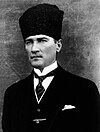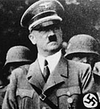User:NikoSilver/Nationality quiz
This is an essay. It contains the advice or opinions of one or more Wikipedia contributors. This page is not an encyclopedia article, nor is it one of Wikipedia's policies or guidelines, as it has not been thoroughly vetted by the community. Some essays represent widespread norms; others only represent minority viewpoints. |
| This page in a nutshell: Nationalism may serve the opposite cause, for more reasons than you may think... |

You are proud of your country "X", your heritage, your culture, your religion, your values, your education. At the same time, you feel somewhat sorry and puzzled for what the neighboring semi-hostile country "Y's" people may feel. You consider their country arrogant or stuck-in-the-mud, their heritage pompus or zilt, their culture hypocritical or stolen, their religion outdated or inflammatory, their values antagonistic or barbaric, and their education propagandistic.[1]
A new DNA ancestry identifier device is invented. You happen to know your family tree to -say- your great-grandfathers, so you go ahead and try to see where your "real roots" start. The results delay for a week, during which you picture your forefathers as some relatives to your known national heroes.[2] You imagine that the blood of your country's leaders runs in your veins. You feel that you must have great relation to great men or women in your X country's history.
When the results arrive, you anxiously open the envelope. You find out that your great-great-grandfather and your great-great-grandmother were actually members of the ethnic group Y. Digging back, you see that more and more of your ancestors are from that other "rival" ethnic group. The results are clear: You are 95% "Y" and 5% unrelated. Your not-so-distant ancestors were speaking Y, they were faithful to the Y religion, they had Y values, Y culture, Y heritage and they even fought to maintain those values against your(?) X country and specifically against the heroes[2] you thought you related to. Actually, they are considered the heroes[3] of that "rival" ethnic group.
What do you do?[4]
Value sets[edit]
 |
 |
 |
 |
 |
When we come down to the (biased?) aphorism that all ethnic groups are vastly mixed, we dare explore the reasons for paradoxical human behavior after the mix. That behavior is considered incompatible (and in extreme examples a form of treason) with the behavior of the ancestors of the newly aquired members to that group. This observation raises the question: "Why the hell would people betray their own, and support their foe?"
The answer is simpler than expected: Sets of values. The newly recruited often find need to identify as such due to personal likings or dislikings. Sometimes they are forced by the circumstances and feared of the consequences. The result is always the same: The next generation has much less attachment to the old status, and the next even less, and so on. Assimilation produces new followers, possibly unaware of their past.
These followers adhere to the new set of values, because they grew up with it, and anything else seems uncommon, and rejected by their peers (stereotypes). However, this adherence is biased, simply because (newly recruited or assimilated or not) those followers tend to explore only their own (new?) sets of values and disregard exploring the others. Propaganda and reverse propaganda also play an important role in the enhancement of the positive elements of one's culture, and negative elements of the other cultures. Hence, their judgement is biased by their limited or even twisted knowledge. So people's minds and opinions are vastly more compatible to their own experiences, rather than to their "genes", to the extent of making wars in order to maintain or expand those values, sometimes even against their own ancestors' sons!
Had they been aware of the merits of the other cultures, and of the constructive criticism on their own culture, then they would be more capable of filtering the elements of those cultures to produce their own set. We are terribly far from that, and even if information was universally available, we still don't know how and if it would be used positively as described. Recent examples of educated people, like Orhan Pamuk's real reasons for the nobel prize,[5] are indeed positive steps, but then again, too microscopically few, and very well buried from the rest, instead of being exemplified.[6]
A wise person, cannot but foresee that indeed such selective information practices only make their own group less susceptible to positive change. That would definitely be a disadvantage in the evolution of this group's value system, and detrimental for their society in general. Therefore, the true patriot, is the one who tries not only to learn the merits of other cultures and their constructive criticism on his own, but also to even try to force this information among his own, in order to help this value system evolution process, knowing that he may be misjudged, knowing that he may be even prosecuted, and knowing that no matter how hard the information push attempt is, most of his compatriots will probably ignore it due to their pre-programmed biases.
Even after writing all that, I admit being the least capable person on earth for practising it. :-(
Notes[edit]
- ^ Examples are fictional, adjectives sound purposely hard to create a sense of tension (for both X and Y sides). You don't really have to have negative feelings for the "rival" nationality to take the test (and nobody would admit so in the first place). This was added for illustrating the contrast.
- ^ a b Those national heroes are probably considered butchers by the "rival" stock.
- ^ The ones that your own(?) ethnic group considers butchers.
- ^ Please use the talkpage for your responses.
- ^ Forgive my unilateral example, I happen to be a victim of the afore mentioned selective information.
- ^ Cite to prove me wrong, I will be pleased.
